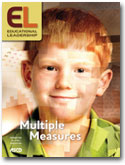The superintendent's office called to schedule my annual evaluation. My heart skipped a beat. I was an experienced principal— successful by some standards but still doubting myself. My annual evaluations were generally positive. Why, then, did I dread this experience? Why was my sleep restless the night before? Each year, I dreaded this conference and frequently left discouraged or even angry over the few harmless suggestions for improvement that the superintendent made. When I shared these feelings (which I assumed were mine alone) with some fellow principals, I found that many shared similar reactions.
I have always been my own severest critic. As principal, I worked hard. Long days and frequent weekend hours catching up were common. However, when comparing myself with others, I always felt somehow inferior. The praise I received from students, occasionally a parent, and, even more rarely, the teachers sustained me in my moments of doubt.
How do principals evaluate their success? How do we become more effective? Can we be judged by the standards that proliferate in our literature? Are evaluations by district officials able to truly reach our honest desire to become better leaders?
Cornerstone Assumptions
- Schools are, in some ways, "long shadows" of their principals. The school looks and feels like its leader. Principals influence teachers who work directly with students, and they influence students themselves. Believe this. It is the truth. If you doubt it, ask the teachers, students, and parents whom you serve!
- The work of the principal is challenging for all—those who are experienced and newly appointed, those in suburban or urban schools, and those in large or small schools. Perhaps, in some cases, it is virtually impossible to achieve as much as you'd like. This fact must not dishearten you, nor can it justify a lack of effort.
- It is imperative to believe that you can improve, regardless of how difficult the school, the teachers, the superintendent, the school board, and all other hindrances. Even in the most difficult systems, we have control over our own behavior.
- Recognizing and valuing your leadership abilitiesis as significant as being honest about your limitations. Becoming discouraged because of inadequacies will lead nowhere!
- A principal's work is of the spirit. We must be convinced that children depend on who we are and what we do. Although psychometric data continue to be significant, we must not reduce our work to counting and sorting numbers.
Assuming Responsibility
- Continue to learn. Roland Barth has taught us that the principal is the "head learner," yet some school leaders rarely, unless directed, attend professional development opportunities. Unless we model continued learning, we can hardly expect it of students or teachers.
- Converse with other principals. Many professional development plans promote "silver bullets" for school leaders, but only those who live in the real world of schools can translate these into reality. Electronic communication networks or an early breakfast or quick dinner with a fellow principal makes conversation possible.
- Listen to teachers, parents, and students. Be aware of informal conversation in the faculty room or among parents. Take note of nonverbal as well as spoken language.
- Find critical friends who care enough to tell you the truth. We simply do not perceive ourselves objectively, and a caring professional friend might gently but honestly provide feedback that you can hear without getting defensive.
- Reflect. Take time to examine your own motivations and behavior. Reflection can take many forms. When I'm walking, running, or engaging in other forms of exercise, I often take stock of such essential questions as, Who is the real person who leads the school? and What am I truly about? Some of us pray.
Perhaps if I had entered my annual evaluation conferences more secure in who I was at the time, what I was about, and what I was doing to improve as both a person and a principal, I would have experienced less anxiety and defensiveness. Taking charge of my own improvement affords me power to be my own best critic and not hand that power over to others.
The Shakespearian advice, "To thine own self be true" echoes through the ages. It might be a good mind-set for us to maintain in our efforts to be ever-improving principals.
